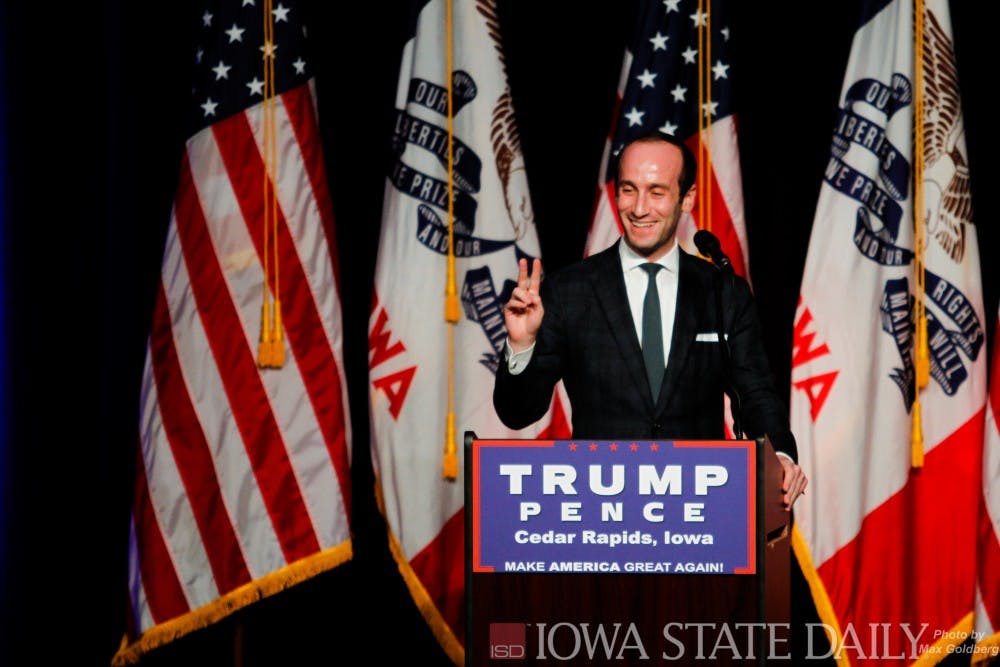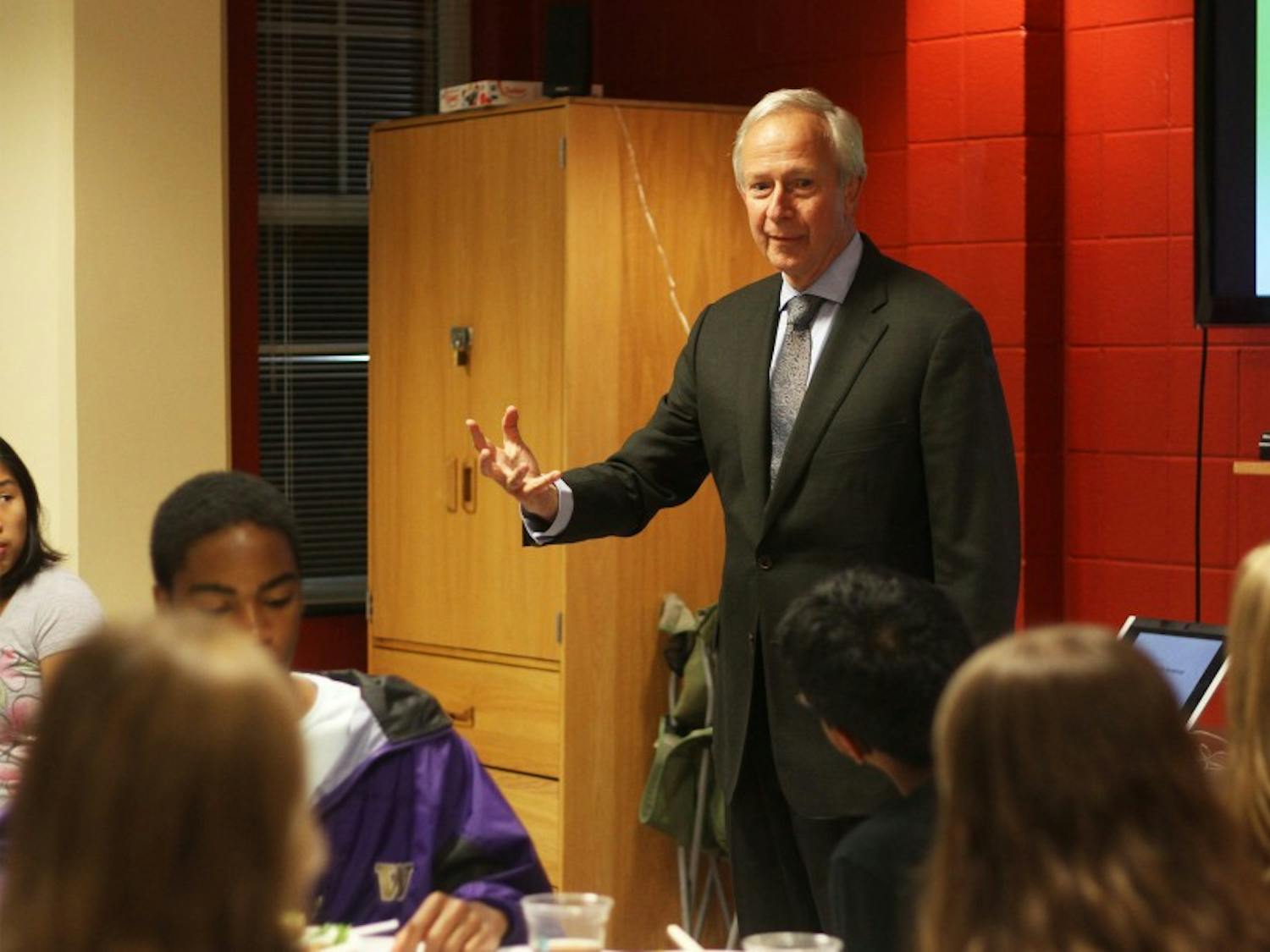When Charlie Rose asked President Donald Trump’s senior advisor Stephen Miller, Trinity ’07, about the “chaos and turmoil” that followed Trump’s executive order halting immigration, Miller responded with a line that was representative of his entire political career.
“If nobody’s disagreeing with what you’re doing, then you’re probably not doing anything that really matters in the scheme of things,” Miller told Rose, Trinity ’64 and Law ’68.
Miller—an outspoken conservative activist since high school—has faced intense scrutiny for his role in drafting and implementing an executive order that includes a halt on immigration from seven predominantly-Muslim countries and indefinitely bans Syrian refugees.
The scale and severity of the ban took many by surprise and triggered protests at airports nationwide. But Miller has vigorously defended the order, which he likely co-authored with Trump's chief strategies Steve Bannon, according to several media reports.
An immigration policy long in the making
Miller’s path from Duke to Capitol Hill to the White House foreshadowed his actions in the Trump administration.
On CBS’s “This Morning,” Miller framed the executive order as a way of stopping threats to the United States from those who did not “truly love and support the United States of America.” Miller also claimed Sunday during an interview on Fox News that the American people agreed with the goal of stopping people with harmful views—particularly radical Islamists—from entering the country.
“They are interested in what we are interested in, which is preventing terrorism from spreading its roots inside the United States of America,” he said. “If you look at recent terror attacks that have occurred in the United States, there’s almost always an immigration nexus, whether it be in the first generation or in the radicalized children of migrants.”
Not everyone agrees with his opinion, however. A 2015 New York Times report cited a study by research center New America, which found that more people were killed in America since 9/11 by non-Muslim extremists than by radical Muslims.
But Miller’s focus on the threat posed by immigration and by radical Islamic terrorism is not new—it reaches back to his time as a well-known conservative activist on Duke’s campus more than a decade ago.
Miller and white nationalist Richard Spencer, a graduate student in Duke’s history department from 2005-07, collaborated on hosting an immigration policy debate in March 2007, according to two former members of the Duke Conservative Union.
Spencer, who founded the National Policy Institute, has delivered a Nazi salute on camera and is credited with coining the term “alt-right." He also made news on Inauguration Day when he was punched in the face during an on-camera interview.
The debate between Peter Laufer, a University of Oregon professor and supporter of open borders, and Peter Brimelow, an immigration restrictionist, focused on whether America is in fact a nation of immigrants and the economic consequences of closing or opening the the U.S. border with Mexico.
“My impression is that this was height of their collaboration,” said Bill English, Trinity ’03, who helped found DCU as an undergraduate and was in graduate school with Spencer at the time of the debate.
English added that he would not characterize Spencer as a mentor to Miller, although he did say that both himself and Spencer “periodically played advisory roles” in the DCU.
It is now clear, English noted, that Spencer and Miller “had different sorts of critiques of immigration.”
“[Spencer] certainly believes that some races are biologically superior to others with regard to intelligence, creativity, self-control and such,” said English, now a professor in the business school at Georgetown University.
English said that neither he nor members of DCU, including Miller, embraced Spencer’s views “when he occasionally tipped his hand” about his beliefs. But Spencer told Mother Jones that he found it “funny” that so few people had picked up on the connection between him and Miller.
"I knew him very well when I was at Duke,” Spencer said in the article. “But I am kind of glad no one's talked about this because I don't want to harm Trump."
Miller told Mother Jones that he had “absolutely no relationship” with Spencer and completely repudiated his views. Neither Miller nor Spencer responded to repeated requests for comment from The Chronicle.
David Bitner, Trinity ’10, was a member of the Duke Conservative Union for two years and a friend of Miller’s, whom he affectionately referred to as “Miller-Time”—the tagline Miller used in his columns for The Chronicle.
Bitner—who called Miller “provocative and hilarious”—noted that he never heard Miller discuss banning immigration from specific countries and never heard him talk about refugees.
“I don’t think that in terms of the substance of the executive order there was any foreshadowing during Miller’s time at Duke,” Bitner said.
He said the primary issue that he associates with Miller was the Duke lacrosse case, when Miller emerged early as a critic of the administration’s approach to the case and an advocate for the accusedplayers' rights to due process.
‘Our enemy yearns to attack’
In addition to conservative political activism, Miller also wrote columns for The Chronicle, some of which reveal his interest in immigration and fighting terrorism through measures many would consider extreme.
“Islamic terrorists have declared holy war on the United States,” Miller wrote in a 2006 column for The Chronicle titled “Unpatriotic Dissent.” “They have declared a death sentence on every man, woman and child living in this country.”
He argued in the column that Americans—including Duke students—who criticized President George Bush’s policy in Iraq or expressed empathy for terrorists were “dissenting in a legal and protected fashion.” But that legal protection, he wrote, with a characteristic flourish for the dramatic, “cannot shield their hands from the possibility of someday being stained with the blood of the innocent Americans whose country they betrayed.”
His analysis of the impact that immigration policy has on national security also stems back to his time at Duke. In another column, Miller drew links between illegal immigration, “political correctness” and the terrorist attacks on Sept. 11.
“We criticize our concerned officials for fear-mongering,” he wrote. “We oppose common-sense security measures. We give driver's licenses to illegal aliens. Meanwhile our enemy yearns to attack with all the force of Sept. 11 multiplied a hundred times. What will it take for us to understand?”
Miller also implied in the same column that lax border security could lead to a weapon of mass destruction being unleashed inside in the United States.
“Does anyone seriously believe that with our porous, undermanned, underfunded domestic security we can really hope to prevent the release of a WMD on our soil once terrorists get their hands on the necessary materials?” he asked.
From Duke to the West Wing
After his time at Duke, Miller’s focus on immigration intensified as he charted an unusual path to the White House.
While working in the congressional office of Alabama Sen. Jeff Sessions, who has been nominated by Trump to be attorney general, Miller created an “immigration handbook” full of talking points against a bipartisan immigration reform bill being considered by Congress. According to Politico, that handbook was essential in defeating the bill.
“We had been working on the ideas in it for months, and Stephen put it in the handbook in a very quick time in a very cogent fashion,” Sessions told Politico. “It was very timely, and it impacted the outcome of the vote.”
Looking at the common threads running through Miller’s career, it is not surprising that he was chosen to write and defend Trump’s order on immigration. Miller has appeared on network and cable TV shows a number of times during the past few days defending its rocky rollout.
Some have suggested that Miller has been given too much free reign to implement his personal political agenda. North Carolina Rep. David Price, a Democrat, specifically singled out Trump’s political advisors for their focus on ideology instead of competent administration during a Monday event at Duke.
“President Trump’s action shows the pitfalls of surrounding himself with amateur advisors, advisors who may be long on ideology but certainly are short on competence, short on experience, short on any sense of this country’s history and what we stand for,” Price said. “Amateur advisors who have no experience in government, no interest in making government work. They welcome the chaos.”
Ideology vs. reality
Those who knew Miller during his time at Duke say that even then, he was more interested in big ideas than the nuts and bolts of governance. Elliott Wolf, Trinity ’08 and former president of Duke Student Government, noted that Miller never held any significant leadership positions on campus.
"I don’t think Stephen has ever been in a governing position," Wolf said. "He was never the leader of the conservatives on campus, but a fringe fighter as head of the Students for Academic Freedom."
But Miller’s apparent prioritization of ideology over practicality may not survive the withering attack it is currently facing. On Monday, MSNBC’s Joe Scarborough lashed out at Miller on his show "Morning Joe." Scarborough suggested that after a meteoric rise based on an immigration-focused ideology, Miller may run into problems when his aggressive style and deep-seated ideology meets the reality of government.
“It was Stephen Miller sitting in the White House saying, ‘We’re not going to go to the other agencies, we’re not going to talk to the lawyers. We’re going to do this all alone,’” Scarborough said about Miller’s role in pushing the executive order. “You’ve got a very young person in the White House on a power trip thinking that you can just write executive orders and tell all of your cabinet agencies to go to hell.”
Lead visual courtesy of Max Goldberg and The Iowa State Daily.
Correction: This article was updated to reflect that Spencer and English had advisory roles in DCU, not Spencer and Miller and was also updated to change a grammatical error in a quote. The Chronicle regrets the error.



